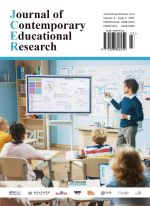Abstract
Objective: To understand the current situation of career planning awareness and readiness of freshman medical students with a background in digital medicine, and to provide references for optimizing the medical education system and career guidance. Methods: A cross-sectional study was conducted on freshman medical students at a university in Yunnan Province using questionnaire survey. Results: A total of 272 questionnaires were distributed and 264 valid questionnaires were returned, yielding an effective response rate of 97.10%. The average score of digital medical awareness of freshman medical students was (70.50 ± 8.81), and 63.63% of the students had a high awareness (score ≧ 70); The average score of career planning awareness and readiness of freshman medical students was (91.76 ± 14.87), and 60.63% of students had high awareness and readiness (score ≧ 90). Pearson correlation analysis showed that the total score of digital medical awareness was positively correlated with the total score of career planning awareness and readiness (r = 0.13, P < 0.05). Conclusion: Freshman medical students’ career planning awareness and readiness are generally good, but their practical application of digital medical-related skills still needs improvement. It is suggested that schools strengthen the integration of interdisciplinary curriculum, introduce digital vocational training modules, and formulate differentiated guidance strategies for different majors to enhance students’ professional competitiveness in the digital medical era.
References
Sun Y, 2025, Research Hotspots and Frontier Progress of International Digital Medicine. China Tissue Engineering Research, 29(14): 2859.
Dhurandhar D, Dhamande M, Shivaleela C, et al., 2025, Exploring Medical Artificial Intelligence Readiness Among Future Physicians: Insights from a Medical College in Central India. Cureus, 17(1): e76835.
Zhang J, 2023, Digital Healthcare Welcomes the Development Trend. China Foreign Trade, (07): 39–41.
Li T, 2022, Discussing the Current Situation and Future Development Direction of Digital Medical Technology. China Medical Equipment, 37(10): 1–3.
Zhao B, Xu Q, Wang X, et al., 2024, Sinicization, Revision and Reliability and Validity Test of Digital Health Literacy Scale. Chinese Nursing Education, 21(01): 89–95.
Savickas ML, Porfeli EJ, 2012, Career Adapt-Abilities Scale: Construction, Reliability, and Measurement Equivalence Across 13 Countries. Journal of Vocational Behavior, 80(3): 661–673.
Zhang Q, Wu J, 2024, Digital Literacy of Medical Students: Scale Development and Analysis of Influencing Factors. China Health Management, 41(07): 787–792.
Cui X, Zhang Y, Wang X, et al., 2024, Research on College Students’ Employment Cognition and Countermeasures under the Background of Artificial Intelligence. Popular Literature and Art, (23): 208–210.
Wang Y, Peng J, Yan Y, et al., 2023, Investigation and Reflection on Medical Students’ Cognition of Artificial Intelligence and its Medical Application in the New Era. China Higher Medical Education, (02): 25–27.
Zeng J, Liu H, Chen T, et al., 2021, Application of Digital Medicine in the Field of Psychiatry. Chinese Journal of Neuropsychiatric Diseases, 47(05): 310–313.
Ritsotakis G, Andreadaki E, Linardakis M, et al., 2021, Nurses’ Health Literacy and Associations with the Nursing Practice Environment. Int Nurs Rev, 68(3): 365–371.
Yang J, Lin Y, Gong B, et al., 2024, Discussion on Strategies to Improve Information Literacy of Medical Students. Journal of Chengdu Medical College, 19(01): 162–164 + 169.
Zhang Y, Liu N, Zhang J, et al., 2019, Survey on Professional Satisfaction of Five-Year Stomatology Students in a Local University. Education and Teaching Forum, (43): 58–61.
